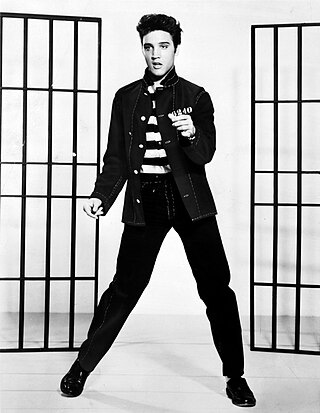
Elvis Aaron Presley, known mononymously as Elvis, was an American singer and actor. Known as the "King of Rock and Roll", he is regarded as one of the most significant cultural figures of the 20th century. Presley's energized interpretations of songs and sexually provocative performance style, combined with a singularly potent mix of influences across color lines during a transformative era in race relations, brought both great success and initial controversy.
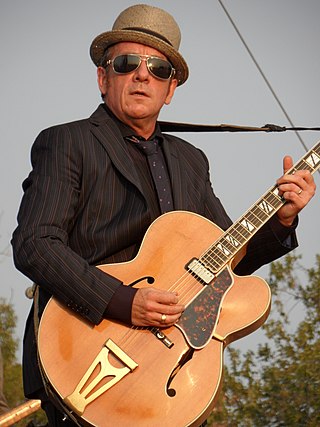
Declan Patrick MacManus, better known by his stage name Elvis Costello, is an English singer, songwriter, record producer, author and television host. According to Rolling Stone, Costello "reinvigorated the literate, lyrical traditions of Bob Dylan and Van Morrison with the raw energy and sass that were principal ethics of punk", noting the "construction of his songs, which set densely layered wordplay in an ever-expanding repertoire of styles." His first album, My Aim Is True (1977), is widely regarded as one of the best debuts in popular music history. It spawned no hit singles, but contains some of Costello's best-known songs, including the ballad "Alison". Costello's next two albums, This Year's Model (1978) and Armed Forces (1979), recorded with his backing band the Attractions, helped define the new wave genre. From late 1977 until early 1980, each of the eight singles he released reached the UK Top 30. His biggest hit single, "Oliver's Army" (1979), sold more than 500,000 copies in Britain. He has had more modest commercial success in the US, but has earned much critical praise. From 1977 until the early 2000s, Costello's albums regularly ranked high on the Village Voice Pazz & Jop critics' poll, with This Year's Model and Imperial Bedroom (1982) voted the best album of their respective years. His biggest US hit single, "Veronica" (1989), reached number 19 on the Billboard Hot 100.
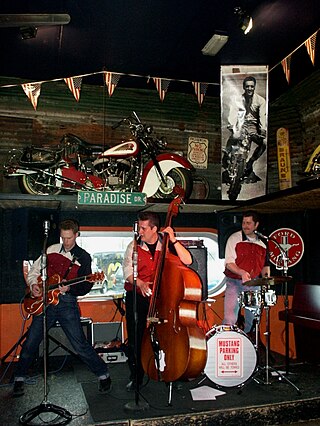
Rockabilly is one of the earliest styles of rock and roll music. It dates back to the early 1950s in the United States, especially the South. As a genre it blends the sound of Western musical styles such as country with that of rhythm and blues, leading to what is considered "classic" rock and roll. Some have also described it as a blend of bluegrass with rock and roll. The term "rockabilly" itself is a portmanteau of "rock" and "hillbilly", the latter a reference to the country music that contributed strongly to the style. Other important influences on rockabilly include western swing, boogie-woogie, jump blues, and electric blues.

The Sun Sessions is a compilation album by American singer Elvis Presley, issued by RCA Records in 1976. The album contains Presley's earliest commercial recordings, made in Memphis, Tennessee for Sun Records in 1954 and 1955. RCA issued the album in the UK in 1975 under the title The Sun Collection. The album features liner notes by Roy Carr of the New Musical Express. The Sun Sessions features most of the tracks Elvis recorded for Sun Records and produced by Sam Phillips, the head of Sun Studios. The Sun Sessions reached number two on the Billboard Country Albums and number 1 on the Cashbox Country Albums charts.

"All Shook Up" is a song recorded by Elvis Presley, published by Elvis Presley Music, and composed by Otis Blackwell. The single topped the U.S. Billboard Top 100 on April 13, 1957, staying there for nine weeks. It also topped the Billboard R&B chart for four weeks, becoming Presley's second single to do so, and peaked at No. 1 on the country chart as well. It is certified 2× platinum by the Recording Industry Association of America.
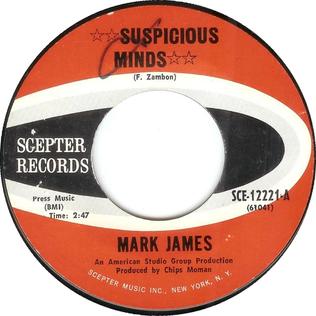
"Suspicious Minds" is a 1968 song written and first recorded by the American songwriter Mark James. After this recording failed commercially, it was recorded by Elvis Presley with the producer Chips Moman. Presley's version reached No.1 on the US Billboard Hot 100, his 18th and final no. 1 single on that chart. In 1999, Presley's RCA Victor Records version was inducted into the Grammy Hall of Fame.

"Can't Help Falling in Love" is a song written by Hugo Peretti, Luigi Creatore, and George David Weiss and published by Gladys Music, Inc. The melody is based on "Plaisir d'amour", a popular French love song composed in 1784 by Jean-Paul-Égide Martini. The song was initially written from the perspective of a woman as "Can't Help Falling in Love with Him", which explains the first and third line ending on "in" and "sin" rather than words rhyming with "you".
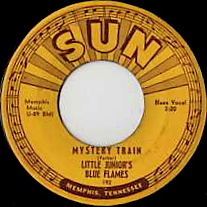
"Mystery Train" is a song written and recorded by American blues musician Junior Parker in 1953. Originally performed in the style of a Memphis blues or rhythm and blues tune, it was inspired by earlier songs and later became a popular rockabilly song, as first covered by Elvis Presley, then numerous others.

Floyd Cramer was an American pianist who became famous for his use of melodic "whole-step" attacks. He was inducted into both the Country Music Hall of Fame and the Rock and Roll Hall of Fame. His signature playing style was a cornerstone of the pop-oriented "Nashville sound" of the 1950s and 1960s. Cramer's "slip-note" or "bent-note" style, in which a passing note slides almost instantly into or away from a chordal note, influenced a generation of pianists. His sound became popular to the degree that he stepped out of his role as a sideman and began touring as a solo act. In 1960, his piano instrumental solo, "Last Date" went to number two on the Billboard Hot 100 pop music chart and sold over one million copies. Its follow-up, "On the Rebound", topped the UK Singles Chart in 1961. As a studio musician, he became one of a cadre of elite players dubbed the Nashville A-Team and he performed on scores of hit records.

The Romantics are an American rock band formed in 1977 in Detroit. The band is often put under the banner of power pop and new wave. They were influenced by 1950s American rock and roll, Detroit's MC5, the Stooges, early Bob Seger, Motown R&B, 1960s North American garage rock as well as the British Invasion rockers.
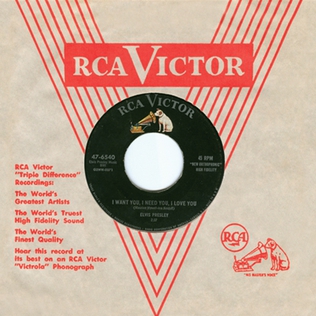
"I Want You, I Need You, I Love You" is a song written by Maurice Mysels and Ira Kosloff. It is best known for being Elvis Presley's seventh single release on the RCA Victor label, produced by Steve Sholes. It was released in May 1956, becoming Presley's second number 1 single on the country music charts, and peaking at number 3 on the US Billboard Top 100 chart, an earlier version of the U.S. Billboard Hot 100. Before the establishment of the Billboard Hot 100 chart in 1958, there were a number of charts including Jukebox plays, Store charts, and Airplay charts; the song reached number 1 on the Billboard Top Sellers in Stores chart.

"In the Ghetto" is a 1969 song written by Mac Davis and recorded by Elvis Presley. It was a major hit released in 1969 as a part of Presley's comeback album, From Elvis in Memphis, and was also available on the single release of "Any Day Now" as the flip side.

"If I Can Dream" is a song made famous by Elvis Presley, written by Walter Earl Brown of The Skylarks for the singer and notable for its similarities with Martin Luther King Jr.'s 1963 "I Have a Dream" speech. The song was published by Elvis Presley's music publishing company Gladys Music. It was recorded by Presley in June 1968, just two months after King's assassination, and also a short time after Robert Kennedy's assassination. The recording was first released to the public as the finale of Presley's '68 Comeback Special.

"I Forgot to Remember to Forget" is a 1955 rockabilly and country song, first recorded by Elvis Presley and written by Stan Kesler and Charlie Feathers. It was Elvis' first no. 1 record nationally. The single was the fifth and final single released on Sun Records before Elvis moved to RCA Records.

"I Don't Remember" is a song by Australian alternative rock band Powderfinger, from the album Dream Days at the Hotel Existence. It made its radio debut on 9 July 2007 on Australian radio stations, and was subsequently released as a single and digital download on 4 August 2007 in Australia, 3 September 2007 in New Zealand, and 13 August 2007 in the United States. The song was written by Powderfinger lead singer Bernard Fanning, and influenced by bassist John Collins. The riff was then developed by guitarist Ian Haug. The song is about reconciling difficulties and arguments, rather than shifting the blame.

Blue Hawaii is the fourth soundtrack album by the American singer Elvis Presley, released on RCA Victor Records in mono and stereo, LPM/LSP 2426, on October 20, 1961. It is the soundtrack to the 1961 film of the same name starring Presley. In the United States, the album spent 20 weeks at the number one slot and 39 weeks in the Top 10 on Billboard's Top Pop LPs chart. It was certified Gold on December 21, 1961, Platinum and 2× Platinum on March 27, 1992, and 3× Platinum on July 30, 2002, by the Recording Industry Association of America. On the US Top Pop Albums chart, Blue Hawaii is second only to the soundtrack of West Side Story as the most successful soundtrack album of the 1960s.

"Watching the Detectives" is a 1977 single by English singer-songwriter Elvis Costello. Inspired by the Clash and Bernard Herrmann, the song features a reggae beat and cynical lyrics.
"Baby Let's Play House" is a song written and originally recorded by Arthur Gunter in 1954 on the Excello Records label, and covered by Elvis Presley the following year on Sun Records. A line from the song was borrowed by John Lennon for his Beatles song "Run for Your Life", released on Rubber Soul in 1965.
"A Good Year for the Roses" is a ballad written by Jerry Chesnut and originally recorded by American country singer George Jones. It rose to #2 on the country singles chart in 1970.
"Pieces of My Life" is a song written by Troy Seals. It was originally recorded by Charlie Rich and appeared on his 1974 album The Silver Fox.

















